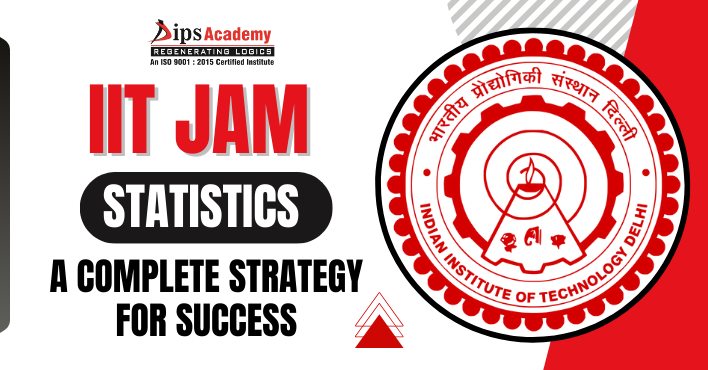IIT JAM Statistics is one of the most popular papers under the Joint Admission Test for M.Sc. conducted by the Indian Institutes of Technology. This exam is mainly for students who want to pursue postgraduate studies in Mathematical Statistics or related fields at top institutions like IITs, IISc, and NITs.
Candidates from mathematics, statistics, or economics backgrounds often choose IIT JAM Statistics to secure admission in highly reputed master’s programs. The exam checks a student’s conceptual understanding, problem-solving speed, and statistical reasoning.
IIT JAM Statistics: Eligibility and Scope
Before you start preparing, it’s important to understand who can appear for the exam and what benefits it offers.
Eligibility:
- You need a Bachelor’s degree (preferably in mathematics/statistics)
- There’s No age limit
- Final-year students are also eligible
Career Scope After IIT JAM Statistics:
- You can pursue an M.Sc in Statistics or Mathematical Statistics from IITs.
- The exam opens up research opportunities in data science and quantitative fields.
- Opportunities in analytics, government jobs, and PhD programs
Understanding the IIT JAM Statistics Exam Pattern
Knowing the exam structure helps in creating a well-aligned preparation plan.
| Section | Type of Questions | Number of Questions | Marks |
| A | Multiple Choice Questions (MCQ) | 30 | 50 |
| B | Multiple Select Questions (MSQ) | 10 | 20 |
| C | Numerical Answer Type (NAT) | 20 | 30 |
- Total Questions: 60
- Total Marks: 100
- Duration: 3 hours
- Negative marking is applicable for MCQs
IIT JAM Mathematical Statistics vs Mathematics Statistics
Many students get confused between IIT JAM Mathematical Statistics and IIT JAM Mathematics Statistics. To clarify, the official paper belongs to the Mathematical Statistics (MS) category, covering both Mathematics and Statistics in equal measure.
The syllabus includes two major parts:
- Mathematics (40%)
- Statistics (60%)
As a result, you need to focus equally on both areas to prepare well.
Detailed IIT JAM MS Syllabus
| Mathematics Section: | Statistics Section: |
| Sequences and Series, Differential Calculus, Integral Calculus, Matrices and Linear Algebra, Vector Calculus | Probability, Random Variables and Distributions, Joint Distributions, Expectation and Moments, Sampling Distributions, Estimation (Point and Interval), Hypothesis Testing, Correlation and Regression |
The IIT JAM Statistics syllabus is vast, but with systematic planning, it becomes manageable.
Step-by-Step Preparation Strategy
1. Know the Syllabus Inside Out
Begin by downloading the official IIT JAM statistics syllabus. Make a checklist of all the topics and mark your weak and strong areas. This will guide your entire preparation journey.
2. Follow a Standard Booklist
For Mathematics:
- Thomas’ Calculus
- Higher Engineering Mathematics by B.S. Grewal
- Linear Algebra by Hoffman and Kunze
For Statistics:
- Fundamentals of Mathematical Statistics by S.C. Gupta and V.K. Kapoor
- Probability and Statistics by Hogg and Tanis
- Introduction to Probability by Sheldon Ross
Stick to 1-2 books per subject to avoid confusion and overlapping content.
3. Make a Monthly and Weekly Study Plan
Create a calendar to cover all topics over 4–5 months. Dedicate:
- 3–4 hours daily for concept building
- 1 day a week for revision and problem solving
- Final month entirely for mock tests and past year papers
Divide your week like this:
- 3 days for statistics
- 2 days for mathematics
- 1 day for test practice and revisions
- 1 day rest or buffer for unfinished tasks
4. Practice Regularly
After reading the theory, solve at least 15–20 problems from each chapter. Focus more on:
- Previous year IIT JAM MS questions
- Concept-based questions from standard books
- Unit-wise practice tests from coaching material
This builds both accuracy and confidence.
Benefits of Joining IIT JAM Statistics Coaching
Enrolling in a reputed IIT JAM Statistics Coaching can give a structured approach to your preparation. Coaching institutes provide:
- Expert faculty guidance
- Topic-wise notes and formula sheets
- Regular mock tests
- Time management tips
If you’re preparing from Delhi, you’ll find some top-rated institutes like DIPS Academy, known for their focused training and experienced faculty for JAM Statistics.
Importance of Study Material and Test Series
Having the right iit jam statistics study material is important. Good study material should have:
- Conceptual explanations
- Solved examples
- Practice problems
- Revision charts
Also, a full-length test series that simulates the actual exam pattern helps assess your preparedness. Make sure your coaching or study resource offers:
- Sectional tests
- Full syllabus mock tests
- Instant evaluation and analysis
Smart Revision Tips
- Create a short notes register for formulas, theorems, and tricks
- Use mind maps and flowcharts to help you revise distributions and tests
- Review important concepts every 2 weeks
- Attempt mock tests in a timed environment
Keep track of your mistakes and make a separate notebook for common errors.
Common Mistakes to Avoid
- Ignoring the mathematics section while focusing only on statistics
- Not solving enough previous year question papers
- Depending only on theory without sufficient practice
- Not revising regularly
- Delaying mock tests until the last moment
A balanced strategy that includes theory, practice, revision, and testing is key to success.
Final 30-Day Strategy
- Focus on revising core concepts
- Solve 3 full-length mock tests per week
- Analyze each test for weak areas
- Focus on accuracy and speed
- Practice short tricks for MCQs
- Strengthen NAT question solving
Conclusion
Preparing for IIT JAM Statistics requires consistent effort, the right resources, and a strategic approach. Whether you’re self-studying or with the support of IIT JAM Statistics Coaching, staying disciplined and regularly testing your knowledge will ensure you stay on track. at fastpanda find more details.
This exam opens the doors to top IITs and prestigious master’s programs in statistics and data science, making the effort worth every second. The key to success lies in starting early, staying regular, and practicing smart.


